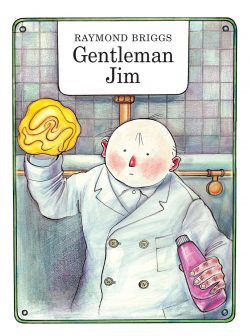

By Raymond Briggs (Jonathan Cape/Drawn & Quarterly)
ISBN: 978-0-22408-524-3 (HB, Jonathan Cape) 978-1-8972-9936-4 (PB, D&Q edition)
Once again a master of comics art has been taken from us, and this time it’s one of the greatest in our medium’s history: a hugely gifted maverick who worked largely outside the established industry, but whose decades of work truly turned sequential graphic narrative into an art form.
Cartoonist, political satirist, philosopher, social commentator and delighter of children of all ages, Raymond Redvers Briggs CBE (18th January 1934 – 9th August 2022) never forgot that kids aren’t fools. Many of his books – ostensibly targeting the young – revel in the target audience’s fascination with all things gross and disgusting and the artist never underestimated an “unformed” mind’s capacity for empathy and understanding. Moreover, unlike so many working in the children’s book industry, he wasn’t afraid to be morose or even sad…
The comic book industry always wilfully neglected and sidelined Briggs’s graphic narratives – which nevertheless reached more hearts and minds than Spider-Man or Dennis the Menace ever will. Briggs’ books remain among the most powerful and important in the entire field.
Deservedly famous works such as Father Christmas, The Snowman, When the Wind Blows, Fungus the Bogeyman, The Bear, Ethel and Earnest, Ug: Boy Genius of the Stone Age and Time for Lights Out are but the tip of an astoundingly impressive, remarkably wide-ranging and quintessentially British iceberg of dry, mordant wit, cheeky sarcasm and poignant fellow-feeling for even the most ghastly and graceless of his unlikely protagonists…
After studying at Wimbledon School of Art, Central and The Slade – and completing a stint of National Service in Catterick – Briggs started working as an illustrator in 1958. He produced dozens of books, ranging from illuminating other creators’ poetry and stories to crafting his own dingily fabulous yarns such as this slyly seditious treatise on self-betterment that first appeared in 1980.
One of his most charmingly bittersweet and contemplative efforts, Gentleman Jim is a mesmerising affectionate portrait of one of life’s always-dreaming no-hoper’s, published just as Thatcherite dogma began to bite and tear into Britain’s already reeling social structures.
Jim Bloggs is a middle-aged bloke who mans a Council-run public toilet or “Gentleman’s Convenience” in Birmingham: diligently and uncomplainingly cleaning and maintaining his subterranean office whilst constantly dreaming of bigger, better, bolder things.
There’s nothing wrong with the job; it’s just that Jim feels he was meant for greater challenges…
At every quiet moment, Jim scans the job section of the newspaper, imagining himself a hero of the Royal Marines or a tail-gunner in a fighter-bomber or an artist or even a doorman in a fancy uniform. It’s never too late…
Jim’s problem is education: he hasn’t any and all these vacant situations want people with “The Levels”… O’s and A’s and whatnot…
At home with his wife Hilda, Jim discusses a change of direction. Inspired by a late film on television, he decides to become a cowboy, maybe even a sheriff. A quick bit of research convinces him that the start-up costs for cowboying are beyond his means and the paperwork would be a nightmare, but after popping into the second-hand bookshop Jim realises that what he really wants to be is a Highwayman…
Even here though, money is a problem. Great black chargers or even plain old valiant steeds cost thousands of pounds. However, when the local Donkey Sanctuary lets him have one of their older ones for free, Jim’s off and running in his new career and living his dream…
Sublimely low key and gentle, the fall into arrant criminality of this ambitious dreamer is a sheer, understated masterpiece of sardonic whimsy to enthral and delight older kids as well as all us adults who never quite made it. Yet…
Raymond Briggs was the human turning point in the evolution of comics from tawdry waste of time to esteemed art form and his books will live forever. If you’re not a fan yet, you inevitably will be …once you start reading them.
© 1980, 2008 Raymond Briggs. All Rights Reserved.
